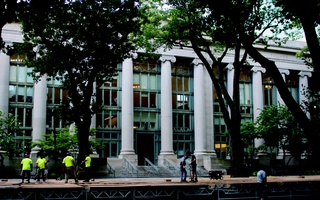{shortcode-5374bedccb64ece7cd2d36acf8a293a9ae0489f8}
In June 2021, Massachusetts District Court Judge Indira Talwani dismissed a class action lawsuit against Harvard University asking for partial tuition reimbursement for semesters with virtual classes. Nearly a year later, a new judge assigned to the case has revived it.
Judge Angel Kelley reversed Talwani’s dismissal of the lawsuit in March, but ruled that the case could only extend to students enrolled at the Law School, the Graduate School of Education, and the School of Public Health during the spring 2020 semester. In March 2020, Harvard moved classes online for the remainder of the semester as it closed its campus due to the Covid-19 pandemic.
In the original suit filed in May 2020, plaintiffs across the University called for tuition reimbursement for any semester limited to virtual learning.
At its core, the lawsuit alleges there was a “breach of contract” between the University and its students during the pandemic: Students enrolled at Harvard had a “reasonable expectation” of in-person classes and amenities but received a virtual education while paying the same fees, it argues.
“Indeed, there is no plausible excuse for [Harvard] to retain and continue to charge full tuition and fees when it did not provide—and has no plans to provide—the promised educational services,” an August 2020 filing from the original lawsuit reads, adding that the University’s conduct was “unjust and inequitable.”
Altogether, students suffered damages exceeding $5 million, the lawsuit alleges.
In October 2020, Harvard asked the district court to dismiss the case, arguing that the University did not breach a contractual promise for in-person education and that Harvard had the right to move instruction online. Further, Harvard’s filing said that the lawsuit would require the courts to pass judgment on the quality of the University’s education in light of the school’s tuition — an “impossible” task.
University spokesperson Jason A. Newton declined to comment on the lawsuit and Kelley’s reopening of the case.
LeElle B. Slifer, an attorney for the plaintiffs and an HLS alumna, said she is “confident” that the court will side in favor of the students.
“They cannot expect for students to pay the same amount for their tuition when they are not getting the benefits that they agreed to when they matriculated at Harvard,” she said. “It is not fair to students.”
Slifer also said the plaintiffs disagree with Kelley’s decision to limit the lawsuit’s scope.
“We just don’t think that is a fair characterization to limit our claims to just spring of 2020,” she said. “We’re limited to it now, but there’s always a possibility we can appeal.”
Abraham Barkhordar, one of the plaintiffs named in the lawsuit and a current third-year student at the Law School, described the stark differences between his experience with in-person and online semesters.
“The remote semesters lacked so much of the peer-to-peer interaction — just meeting people in the laundry room or as you’re walking around the dorms,” he said. “That doesn’t happen online.”
Barkhordar added that he believes it was the “right thing” to file the suit.
“No matter how long it goes on, whatever the result is, it was right to bring it and it was right to at least try to hold the school responsible,” he said.
On March 7, the plaintiffs entered an amended complaint in accordance with Kelley’s ruling.
Harvard has until April 4 to file its answer.
—Staff writer Cara J. Chang can be reached at cara.chang@thecrimson.com. Follow her on Twitter @CaraChang20.
—Staff writer Isabella B. Cho can be reached at isabella.cho@thecrimson.com. Follow her on Twitter @izbcho.
Read more in News
Moving Beyond ‘Pandemic Mayor’: Cambridge Mayor Sumbul Siddiqui Talks Goals for Second TermRecommended Articles
-
 Graduate Students Advocate for Tuition Reimbursements, Extended Health Insurance Coverage Due to Remote Learning Transition
Graduate Students Advocate for Tuition Reimbursements, Extended Health Insurance Coverage Due to Remote Learning Transition -
 Harvard Law Student Files Class Action Lawsuit Demanding Tuition Reimbursement
Harvard Law Student Files Class Action Lawsuit Demanding Tuition Reimbursement -
 Plaintiffs’ Law Association Hosts Forum on Tuition Reimbursement Class Action Lawsuit Against Harvard
Plaintiffs’ Law Association Hosts Forum on Tuition Reimbursement Class Action Lawsuit Against Harvard













